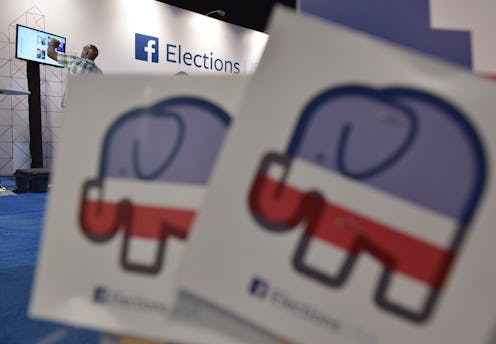What a week for politics — the GOP primary debate saw Donald Trump making sexist comments, Mike Huckabee insisted that the military's purpose is to "kill people and break things," and Ben Carson reminded everyone that he once separated "Siamese" twins. Democratic presidential candidate Bernie Sanders pointedly live-tweeted the whole debate, and Democratic frontrunner Hillary Clinton won some support from Kim Kardashian. And on Thursday, the Democratic Party announced that its first primary debate would be held on October 13, more than two months after the first GOP debate. This decision, coupled with the fact the Republican candidates spent a great deal of time talking about Clinton during their own debate, makes it seem like Democrats and Republicans alike view it as inevitable that Clinton will obtain the Democratic nomination.
You might think, after watching Thursday night's GOP debate, that Clinton has no competition in her party, that there are no other Democratic candidates. She is certainly polling well ahead of Sanders, who is currently in second place. But as Noah Gordon pointed out in The Atlantic back in April, Clinton was polling ahead of Obama for a long time ahead of the 2008 elections. She has the advantage of widespread recognition; she is something of a household name in that she has been in the political sphere for such a long time — for many, it seems only natural that after being a senator, First Lady, and Secretary of State, she would proceed to the presidency. But it is precisely because of this illusion of inevitability that we should not underestimate Sanders, who is keen to see the American people launch a political revolution.
Martin O'Malley and Sanders, two Democrats running for president, have vocalized their disappointment with the debate schedule released by the DNC, with O'Malley accusing party bosses of stacking the deck in Clinton's favor and Sanders insisting that having only six debates before the primaries is not sufficient. They're right, of course — the public perception of Clinton as the natural choice, as well as a general skepticism of the American political system, make it seem like the election is over and won before the primaries have even started. For the many Americans who are exhausted with the stalemates and disagreements that riddle American politics, there is no incentive to be an educated voter if there is not even an illusion of choice. And with only four Democratic debates scheduled before the Iowa caucuses, O'Malley, the former governor of Maryland, is right in saying that Clinton will easily be able to dodge subjects that don't appeal to her. At the very least, it will be difficult for Sanders, a senator from Vermont, and him to present themselves as viable options for the nomination in this short amount of time.
Clinton manages to be the most visible Democratic candidate even though she doesn't show up at events like Netroots Nation and gets away with avoiding press questions for weeks at a time. She is, in the GOP's view, the only real competition that the Republican nominee will face ahead of the election. But even as she shells out powerful statements on Black Lives Matter, Planned Parenthood, and climate change, her track record on the Keystone pipeline, the Trans-Pacific Partnership, and other hot-button issues has been confusing at best. Meanwhile, even though Sanders faced backlash after the BLM action at Netroots, he is slowly but surely learning both the language of and finding his footing in the movement. His track record cannot be an excuse to slack on issues like civil rights and feminism now, of course, but it has been fairly consistent, while Clinton's has not.
Here is what would need to happen between now and the primaries for the election not to devolve into Clinton versus the Republican Party — though, from what we've seen thus far, it has already started to become that.
- The DNC should add additional debates to its schedule.
- The DNC needs to take the Republican candidates more seriously. Between creating bingo boards and releasing videos mocking Trump, there has been little room for a serious assessment of Republican talking points.
- Clinton should be more wary of the "inevitability" label she has, perhaps involuntarily, received.
Marco Rubio and John Kasich said at Thursday's debate that Trump has struck a nerve, but so too has Sanders. It is no accident that Trump is polling ahead of the other candidates; he is skilled at getting and maintaining attention, and his inflammatory comments — though predominantly untrue and offensive — manage to attract the attention of people who have long since given up on American politics.
But Sanders is striking a nerve with Americans, too; he is pushing economic and social inequality into the public spotlight while simultaneously being a fierce advocate for tuition-free higher education, the fight against climate change, and a woman's right to choose what's best for her. A self-declared socialist, he has been drawing large crowds in places like Madison, Wisconsin — in GOP candidate Scott Walker's own state — because people are angry, they are tired, and they want to do something about the injustice they've either seen or experienced.
Clinton's nomination is not inevitable, and both the Democratic and Republican Parties should be cognizant of this. She has already recognized that she has real competition in Sanders; it's time for everyone else to do the same.
